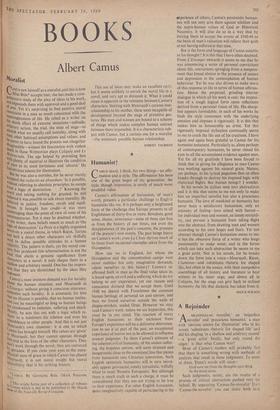BOOKS
Albert Cam us
Moralist
CAmos saw himself as a moralist,and this is how Miss Brde* accepts him; she has made a com- aildPrehensive study of the play of ideas in his work, of expounds them with approval and a good deal e„ awe- Yet it's surprising to find positive moral nYnvietton in a man so much concerned with the ihicaninglessness of life. He relied as a writer on "fle shock effect of extreme situations—solitude, arbitrary action, the trial, the state of siege—to abolish what we usually call morality, along with rnh_nst other habitual assumptions and values; and e'tie. seems to have found the process not altogether disagreeable--witness the fascination with violent Aciath in those Websterian plays Caligula and Le ,gientendu. The age helped by providing him 'or plenty of material to illustrate the condition an at its most fortuitous and 'absurd.' He "adm obvious talents for illustration.
aUt he was also a moralist, for he never merely wc.c,ePted the reductio ad absurdum. 'Is it possible, frItnout referring to absolute principles, to escape ni a logic of destruction . . .?' Knowing the bworst and taking nothing for granted, he still betli,eved it was possible to talk about morality. He ibel!eved in justice, freedom, revolt and equil- e rinni. It brought him credit—it was more encouraging than the point of view of most of his 1°11teMporaries. Yet it may be doubted whether, in the Writer, these beliefs meant as much as'tthe „Qgie of destruction.' La Peste is a highly organised "oVel00 a moral theme, in which Rieux, Tarrou aulitcl half a dozen other characters ate skilfully 'ell to define possible attitudes to a human calamity. The pattern is there, yet the moral con- ckc.rn that produced this schematisation is not the _Ind that elicits a genuine significance from scharacters in a novel; it only shapes them in a &hallow and arbitrary mould. One has the im pres- 'en that they are diminished by the ideas they rePresent. "Camus's most insistent demand was for lucidity the human situation, and Meursault in 141ranger, without giving it conscious utterance, 111:1130dies such lucidity. It is axiomatic for him ti at no illusion is possible, that no human institu- :11 can be meaningful so long as human beings m'e condemned to isolation, suffering and death. cutely, he acts this out with a logic which re- es to a minimum his relation and even his Ne4sembla11ce to other people. And this is not just eursault's own situation : it is one to which -aintis has brought himself. His values are `given' Meursault, but they cannot operate through ditli and in the lives of the other characters. They bnn't work through the novel; they are conveyed Y Paradox. If you close your eyes to the meta- 1;1411'sical state of grace in which Camus has placed ; ,eursault, it is not moral insight but moral 'nsensibility that is his striking feature.
35:Tutus'. By Germaine Bree. (Mark Paterson,
to teThis article forms part of a collection of tributes isi amus which is due to be published in the March ue of the Nouvelle Revue Francaise.
This use of ideas may make an excellent red!; but it seems unlikely to enrich the moral life in a novel, and very apt to diminish it. What it could mean is apparent in the relations between Camus's characters. Starting with Meursault's curious non- relationship to his mother, these seem incapable of development beyond the stage of primitive ges- tures. His men and women are bound to a scheme of things which makes complex human contact between them impossible. It is a characteristic sub- ject with Camus, but a curious one for a moralist —the minimum possible human relationship.
ROBERT TAUBMAN


































 Previous page
Previous page